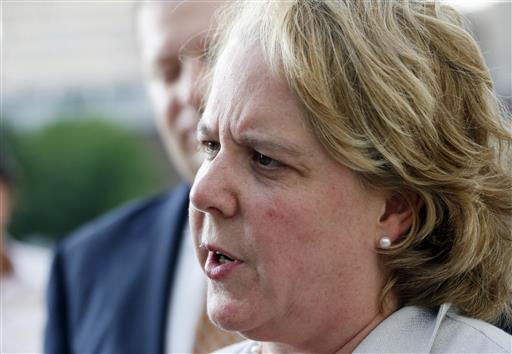Judge: Mississippi law creates inequality for gay marriage

In this file photo, Roberta Kaplan, a New York based attorney, representing Campaign for Southern Equality and a lesbian couple, speaks with reporters following a day of testimony at the federal courthouse in Jackson, Miss. (AP Photo/Rogelio V. Solis, File)
JACKSON, Miss. — Mississippi clerks cannot cite their own religious beliefs to recuse themselves from issuing marriage licenses to same-sex couples, under a ruling a federal judge handed down Monday.
The effect of the ruling by U.S. District Judge Carlton Reeves is that the state can’t enforce part of a religious objections bill that was supposed to become law Friday.
Reeves is extending his previous order that overturned Mississippi’s ban on same-sex marriage. He says circuit clerks are required to provide equal treatment for all couples, gay or straight. He also said that all 82 circuit clerks must be given formal notice of that requirement.
Mississippi’s religious objections measure, House Bill 1523 , was filed in response to last summer’s U.S. Supreme Court ruling that legalized gay marriage nationwide. That ruling is called the Obergefell case, after the man who filed it.
“Mississippi’s elected officials may disagree with Obergefell, of course, and may express that disagreement as they see fit — by advocating for a constitutional amendment to overturn the decision, for example,” Reeves wrote Monday. “But the marriage license issue will not be adjudicated anew after every legislative session.”
Article continues after this advertisementAttorneys were still waiting on rulings from Reeves in two other lawsuits that seek to block all of the religious objections law, including provisions that could affect schools’ bathroom policies for transgender students.
Article continues after this advertisementRoberta Kaplan, a New York-based attorney, represents Campaign for Southern Equality in two lawsuits challenging House Bill 1523, including the one on which Reeves ruled Monday. She issued a statement praising his decision.
“A year after the Supreme Court guaranteed marriage equality in the Obergefell decision, we are delighted that Judge Reeves reaffirmed the power of federal courts to definitively say what the United States Constitution means,” Kaplan said.
Attorneys for Republican Gov. Phil Bryant and Democratic Attorney General Jim Hood have defended House Bill 1523 in court.
“Our attorneys received the order late this afternoon and are reviewing it,” Bryant spokesman Clay Chandler said Monday.
Republican Lt. Gov. Tate Reeves criticized the decision of Judge Reeves, who is no relation.
“If this opinion by the federal court denies even one Mississippian of their fundamental right to practice their religion, then all Mississippians are denied their 1st Amendment rights,” Tate Reeves said in a statement. “I hope the state’s attorneys will quickly appeal this decision to the 5th Circuit to protect the deeply held religious beliefs of all Mississippians.”
RELATED STORIES
Mississippi judge rules to allow same-sex couples to adopt children